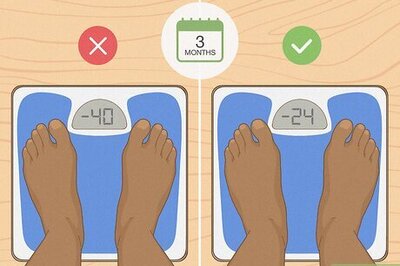
views
How to Stop Feeling Bored at Work
Take an unplugged vacation. If you have enough paid time off, take a few days to completely step away from your computer and separate yourself from work. Some time off can help you clear your head and try to understand where your boredom is coming from (and what you can do about it). You don’t even have to go anywhere—having a staycation from the comfort of your couch works just as well! If you don’t have any vacation time, ask if you can work from home for a few days instead. Studies have shown that people who take more vacations are actually more productive than those who don’t.
Talk to your boss about how you’re feeling. Set up a meeting with your boss and express your feelings of boredom and distraction. Express to them that you want to take on new challenges that better fulfill your needs and align with your interests. Be prepared with a solution, e.g., the kinds of tasks you want to take on or changes you want to make to your work schedule. A great boss will not only help you toward your goals but will also appreciate your commitment to growth and learning. If you don’t have a positive relationship with your boss, or they’re not the type to accept feedback, you may want to skip this step.
Volunteer for new projects and tasks. Look for opportunities within your workplace to improve on and practice your skills. Offer to partner with someone on an upcoming presentation or take point on a new marketing strategy. By challenging yourself to try new things, you’ll likely cure some of your feelings of boredom at work. Even if you’re not the lead on a task, you may be able to learn something new from your colleagues and gain valuable connections.
Look for fulfillment outside your workplace. Being completely fulfilled by your work isn’t a reality for most people—but you can feel less bored at work by filling your tank in your downtime. Find a new hobby, make new friends, volunteer, or attend community events. If you still want your activities to be work-related, join an advisory board or look for mentoring opportunities in your field. Alternatively, start a side hustle or side project. You could try a creative passion project, like producing that indie EP you’ve always wanted to, or a work-related side hustle to bring in some more money to fund your long-term goals.
Look for training opportunities relevant to your career goals. You may not have the necessary skills for your dream job—for now. Explore opportunities to develop those competencies, either outside or within your workplace. Browse online courses or community college classes that will help you work towards your goals. Or, ask your supervisor about any professional development opportunities you’d be eligible for.
Take action against systemic issues in your workplace. Unfortunately, not every workplace is inclusive, and opportunities for meaningful work (and compensation) can be inequitably distributed. If you feel a lack of inclusion in your workplace, the absence of belonging may present itself as boredom and discontent. Even finding fulfilling experiences outside of work isn’t equitably possible. Many life-affirming leisure activities, like concerts, sports events, museum visits, writing classes, and therapy, are extremely expensive and inaccessible. Plus, they can take up a lot of time and energy that you may not have. To push back against exclusive practices and mindsets in your workplace, you can join or form a union, get involved in political organizing, or establish an affinity group within your company.
Start a job search to find work that aligns with your interests. If you try all of the previous methods and you still feel constantly bored at work, it may be time to quit your current job. Now that you’ve taken the time to reflect on your personal values as well as what you really want out of a job, look for fulfilling work that aligns with your values and interests.
Quick Solutions to Workplace Boredom
Put on some music. Put on your favorite playlist of upbeat tunes or motivational tracks. Music can add a dose of fun and energy to your workplace, and it may even distract your brain enough to make the hours pass faster. Some studies have shown that instrumental and classical music, in particular, can boost your mood and enhance your cognitive ability.
Complete your to-do list. It can be difficult to motivate yourself when you’re bored, but doing work is probably the best way to stop being bored at work! Remind yourself that you have to be at work anyway, so you might as well complete your tasks rather than staying late or stressing over them later. If you’re struggling to get started, make a to-do list of everything you want to get done in the next week (or hour).
Combine repetitive tasks and get them over with. If you’re feeling bored because you know you have a pile of repetitive, tedious tasks to get through…get them out of the way! Do them all at once in a super-charged, super-focused batch of work. Set a timer and see if you can complete all of the tasks within that time. Once you’re finished, you can take a break or move on to more interesting work!
Reduce your distractions. Identify the thing that’s slowing down your productivity, whether it’s social media, a full email inbox, or a task that you’re dreading. If it’s something you’re able to control, address the distraction now so you can get some work done. If your main distraction is social media, for example, sign out of all your social accounts or put your phone away in a drawer—out of sight, out of mind. If your distraction is something more difficult to control, like a headache, try taking a walk around the block and drinking a bottle of water before returning to your desk.
Give yourself consistent rewards. Reward yourself for your achievements, even if they’re as small as ticking an item off your to-do list (or just writing the to-do list itself). Your brain will start to build the connection between work and enjoyable rewards, which will make you feel more motivated and less bored. Try rewards like: Eating your favorite snack. Taking a walk in a nearby park. Buying yourself your favorite coffee beverage. Spending a micro-break scrolling on social media or playing an online game. Visiting a new place in your area. Dedicating 10-15 minutes to your favorite hobby.
Get some exercise. Use your breaks at work to get some physical movement in and rejuvenate your body. Go for a walk around the block, take a lunchtime jog in the park, or simply do a light stretch at your desk. If possible, do something more involved, like a slow yoga routine or dance workout.
Go on a lunch date. Call up a friend or ask a colleague to grab a break-time coffee with you. Even if you only have a few minutes to spend together, a little lunch date can break up the monotony of the day and give you a boost of energy after spending time with something you care about. If you’re not sure how to call, check out the social networking site LetsLunch. Connect your profile to the site and set up a public meeting place. The site will match you with someone who wants to join you for a professional networking lunch.
Take regular breaks. Set alarms to make sure you take all of your allotted breaks. Even if you don’t have an “official” break, try to take a micro-break of 10-15 minutes after every 60 minutes of work. Taking consistent breaks will help you fight off boredom, as well as exhaustion and burnout.
Understanding Your Boredom
Notice and name your boredom. Avoid immediately acting on your feeling of boredom. If you can resist the urge to immediately satiate your boredom with mindless scrolling or a similar activity, you’ll have the opportunity to channel your boredom into something positive. Acknowledge the fact that you feel bored, but don’t make any snap decisions to escape that feeling (e.g., quitting your job or snapping at a colleague). Consider the feelings that live under the umbrella category of “bored,” like “apathetic,” “inferior,” or “indifferent.” Do any of those emotions resonate with you? By explicitly noticing your boredom and any feelings attached to it, you’ll have a much easier time figuring out what you can do to escape your bored state.
Decipher what type(s) of boredom you’re feeling. Ask yourself what your boredom is trying to tell you—do you just need a 5-minute break because you’ve worked too long without stopping? Or are your everyday tasks becoming monotonous and you’re losing the motivation to complete them? Is there a specific type of task you feel bored by, or is it the overall experience and prospects of your position? As you answer, identify which types of boredom you’re experiencing: Indifferent Boredom: Feels like relaxation or cheerful fatigue. Reflects a general indifference to the external world. May boost rest and recovery on busy days. Calibrating Boredom: Occurs when you’re not engaged with a task and your mind begins to drift. May manifest as wandering thoughts or wanting to leave a situation but not knowing how. Searching Boredom: Defined by restlessness. Includes an active search for distractions to ease the negative feelings of boredom. May ignite activity and bring about positive outcomes like creativity, growth, and change. Reactive Boredom: Arises when you’re faced with a tedious or repetitive task, causing restlessness and frustration that may be expressed in an angry or aggressive way. You may fantasize about other options or feel anxious to escape. Apathetic Boredom: Relates to feelings of disinterest, detachment, or a lack of motivation. You may feel disengaged from activities you’d normally enjoy and like you’re “going through the motions” of life. May be a symptom of chronic stress, depression, and other mental health issues.
Reflect on what your boredom is trying to tell you before taking action. Being bored at work is a sign that something isn’t sitting right with you—regardless of the type of boredom or the reasons behind it. By evaluating what your boredom is trying to tell you, you’ll be better equipped to decide what to do about it. Maybe you simply need to take a day off, maybe you need to find a hobby outside of work, or maybe you need to quit your job entirely. If you like your work’s mission and your team, maybe you need to adjust the type of tasks you’re doing or the schedule you’re doing it on. If you love engaging with others and your job is completely independent, maybe you’re feeling bored out of a lack of interaction. If you feel like your work or mission isn’t meaningful, maybe you can talk to a supervisor or colleague about shaping your work tasks to feel more fulfilling.
Signs You’re Bored at Work
You’re wondering if your work even matters. You may be unsure of how (or if) your work adds value to your organization or society in general. You may even be questioning whether your work matters to your life, or anyone else’s for that matter. Try to figure out what “meaningful work” means to you. Define your personal values and consider whether your job aligns with those. If it doesn’t, what kind of career path does? Identify people in your life that you deeply respect for what they do and offer to the world. If you have a friend who’s a teacher, for example, maybe you value public service and education. That doesn’t mean you have to be a teacher, per se, but you might enjoy finding a way to give back to your community or educate others on topics you’re passionate about.
You think you have more to offer. Your professional duties may be less challenging than what you’re truly capable of. While it may seem nice in theory to take things easy when it comes to work, you may end up losing some of your advanced skills and become pretty bored if left unchallenged. Talk to your boss about taking on any new projects or tasks where you can practice your skills. A good boss will help you find new challenges to harness your full potential and keep you feeling fulfilled.
You ask yourself how you ended up where you are. You may have left college with certain dreams, then find yourself 10 years later in a job that doesn't at all match those goals. Especially early on in a career, it’s normal to accept jobs as stepping stones (plus, you have to pay the bills somehow). If you’re feeling completely unfulfilled, however, it may be worth changing course toward your original aspirations. Reflect on what originally drew you to your position. What classes did you enjoy in school? What excited you about the field? What did you see as your original end goal when accepting this job? Don’t give up on your dreams, even if quitting your job or changing industries isn’t an option right now. Look for volunteer, networking, or hobbyist opportunities to pursue your dream. Or, take a local community college course or an online class to develop more skills in your goal area.
You feel like you should be doing more right now. Maybe you’re constantly drowning under endless to-do lists and emails, so when you do get to slow down, you feel…bored. If you’re struggling to relax and do nothing during your downtime, this boredom issue may stem from your work-life balance. Leaning too heavily on the work part of the work-life balance scale can lead to burnout, chronic stress, and fatigue. Take every opportunity you can to rest and recharge. Watch TV, listen to podcasts, pick up a new hobby—try to put work out of your mind as much as possible.
Causes of Workplace Boredom
Workplace boredom may stem from lack of meaning or challenge in your work. If your position isn’t taking advantage of your full capabilities and pushing you to learn and grow, you may have difficulty staying focused on your daily tasks. Similarly, monotonous busy work that doesn’t align with your interests and values may make you feel bored or lethargic. Other contributing factors of chronic workplace boredom include: Bleak and isolating work environments—such as a gray cubicle with few opportunities for socialization, engagement, and collaboration. Lack of autonomy at work—if your work offers no opportunity for creativity or innovation, you can start to feel more like a robot than a human and become demotivated. Exhaustion in other areas of your life—if you have personal goals or issues that are taking your energy away from work, you may become less motivated by and interested in your job. Lack of clear goals—if you’ve been in your position for a long time, you may begin to feel lost or stuck without a clear goal for upward mobility or growth potential.
Pros and Cons of Workplace Boredom
Being bored can have positive effects, like giving your brain a break. When boredom is handled with intention, these idle moments may allow your brain to pause for a moment from the constant distractions and overwhelm of life. Boredom can give you a chance to reflect on how you’re feeling and ask yourself if you’re on the right path or doing the right thing with your life. Another pro of being bored at work is having the opportunity to daydream. Daydreaming, in return, can bring about bursts of creativity and innovation.
Workplace boredom can negatively affect your mental and physical health. Being chronically bored at work can lead to risky decision-making, increased stress, susceptibility to anxiety or depression, and the development of bad habits like substance abuse or unhealthy eating. Workplace boredom can also decrease the level and quality of your work, as lethargy around your task may lead to costly mistakes and even dangerous accidents. Many office employees also engage in “cyberloafing” when bored at work, which describes aimless internet browsing simply because one is born. After prolonged exposure, being bored at work can even cause burnout, decreases in job satisfaction, and—in rare cases—hallucinations.



















Comments
0 comment